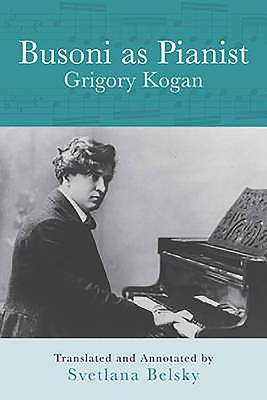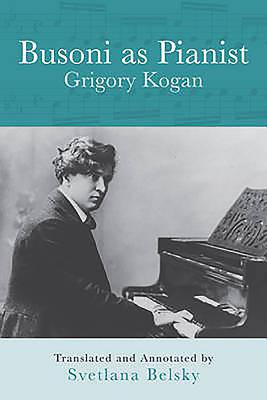
Bedankt voor het vertrouwen het afgelopen jaar! Om jou te bedanken bieden we GRATIS verzending (in België) aan op alles gedurende de hele maand januari.
- Afhalen na 1 uur in een winkel met voorraad
- Gratis thuislevering in België vanaf € 30
- Ruim aanbod met 7 miljoen producten
Bedankt voor het vertrouwen het afgelopen jaar! Om jou te bedanken bieden we GRATIS verzending (in België) aan op alles gedurende de hele maand januari.
- Afhalen na 1 uur in een winkel met voorraad
- Gratis thuislevering in België vanaf € 30
- Ruim aanbod met 7 miljoen producten
Zoeken
€ 177,45
+ 354 punten
Omschrijving
Ferruccio Busoni is most widely known today as the composer of such works as the Second Violin Sonata, the incidental music for Gozzi's Turandot, and the most monumental piano concerto in the repertory (some eighty minutes long, with male chorus in the finale). But Busoni was also renowned in his day as an author and pedagogue and, most especially, as a pianist. Busoni's recordings of pieces by Chopin and Liszt -- and of his own arrangements of keyboard works by Bach and Beethoven -- are much prized and studied today by connoisseurs of piano playing. Yet even his most important biographers have cast only a cursory glance at the pianistic aspect of Busoni's fascinating career. Grigory Kogan's book Busoni as Pianist (published in Russian in 1964, and here translated for the first time) was and remains the first and only study to concentrate exclusively on Busoni's contributions to the world of the piano. Busoni as Pianist summarizes reviews of Busoni's playing and his own writings on the subject. It also closely analyzes the surviving piano roles and recordings, and examines Busoni's editions, arrangements, and pedagogical output. As such, it will be of interest to pianists, teachers and students of the piano, historians, and all who love piano music and the art of piano playing. Grigory Kogan (1901-1979) was a leading Soviet pianist and music critic. A conservatory professor at the age of twenty-one, Kogan created the first-ever course in Russia dealing with the history and theory of pianism. Through his brilliant lectures, his concert performances, and his many books, articles, and reviews, Kogan influenced an entire generation of Soviet pianists. Svetlana Belsky is a teacher and performer, and is coordinator of Piano Studies at the University of Chicago.
Specificaties
Betrokkenen
- Auteur(s):
- Vertaler(s):
- Uitgeverij:
Inhoud
- Aantal bladzijden:
- 197
- Taal:
- Engels
- Reeks:
- Reeksnummer:
- nr. 73
Eigenschappen
- Productcode (EAN):
- 9781580463355
- Verschijningsdatum:
- 30/01/2010
- Uitvoering:
- Hardcover
- Formaat:
- Genaaid
- Afmetingen:
- 155 mm x 234 mm
- Gewicht:
- 476 g

Alleen bij Standaard Boekhandel
+ 354 punten op je klantenkaart van Standaard Boekhandel
Beoordelingen
We publiceren alleen reviews die voldoen aan de voorwaarden voor reviews. Bekijk onze voorwaarden voor reviews.









